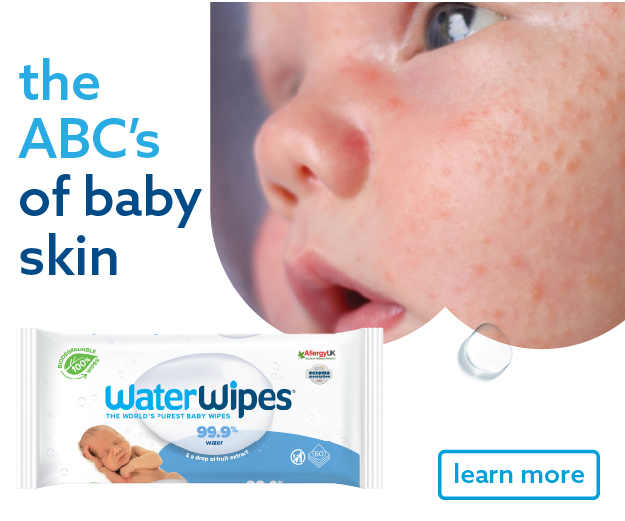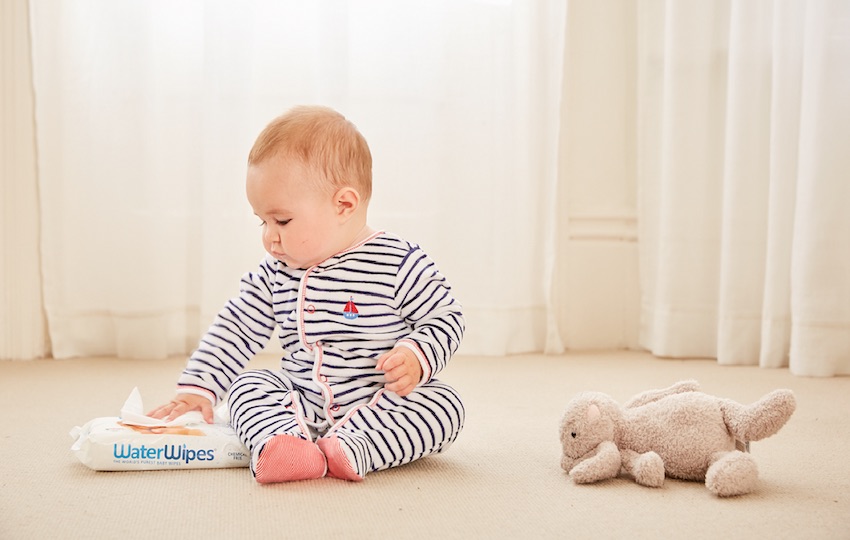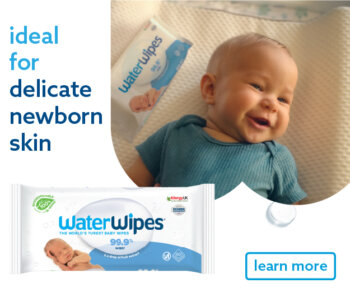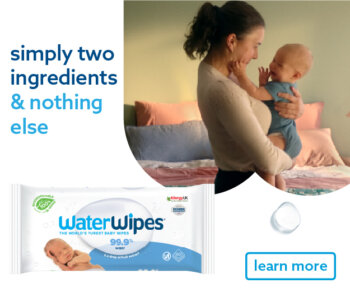Media kindly brought to you by WaterWipes
-
What is newborn baby acne and what does it look like?
Newborn baby acne is a skin condition where tiny red or white bumps or pimples appear on a baby’s skin, typically when they’re between one and four weeks of age – although some babies are born with it.
The medical term for baby acne is erythema toxicum neonatorum (ETN) but that makes it sound more alarming than it is. It’s actually a very common condition that affects up to four or five babies in every 10*.
Baby acne should not be confused with infantile acne which begins later (between three and six months of age) or adult acne. If you’re unsure, please consult your GP.
“The spots first appeared on my son’s face when he was about 10 days old and I was convinced it was because I was doing something wrong – perhaps washing him too much or even not enough. I also wondered whether he could be allergic to his formula. I shared my worries with the other mums at my mums’ group, lots of whom were second and third-time parents, and they explained that it was just newborn baby acne and that lots of their older kids had had it just after birth too. I felt a lot better after that and stopped trying to ‘fix’ it. After a month it was gone. It’s frustrating but you do just have to be patient.”
Celine, mum to Ricky, one
-
What causes newborn baby acne?
Doctors don’t know for sure why newborn baby acne develops but one of the most popular theories is that hormones passed from mum to baby through the placenta – and also breastmilk – are to blame.
These hormones aggravate the sebaceous glands causing pimples to break out on the newborn’s face, usually on the cheeks, nose and forehead, but sometimes on baby’s neck, back and chest too.
Interesting fact: Newborn baby acne is more common in boys.
-
How long does newborn baby acne last?
Newborn aby acne usually only lasts a few days, and in the vast majority of cases is completely gone within two weeks. Sometimes spots can appear only to disappear a few hours later and sometimes they will stick around for three to four months. Recurrences can happen but are generally very mild.
“It sounds awful, I know, but when my baby first developed the acne all I could think – once I knew it was nothing to worry about – was, ‘Oh no, she’s not perfect anymore. What will people say?’ Of course, nobody said anything. Well, nothing unkind anyway. If I brought it up (and it was always me), they just shared stories of their own child’s ailments, from eczema to cradle cap, and how they’d also been a mix of concerned and embarrassed which actually really helped and made me feel less like a Disney villain.”
Sarah, mum to Molly, 1

-
Newborn baby acne treatment
- Newborn baby acne usually clears up on its own after a few weeks but there are some things you can do to help it along.
- Keep your baby’s face clean with cooled boiled water or WaterWipes biodegradable, vegan, cruelty-free baby wet wipes.
- Always gently pat baby’s skin when drying.
- If you’re breastfeeding, try softly dabbing breastmilk on the spots. Lots of mums swear by it.
- Do not use acne creams intended for older children and adults or harsh products generally.
- Try not to pick or scratch the acne – it’ll disappear when it’s ready.
- If the problem persists or is severe, ask your doctor about prescription or over-the-counter medication that might help.
Interesting fact: Newborn baby acne is also known as neonatal acne.
-
Why there’s no need to be concerned about newborn baby acne
While red blotches on your baby’s previously perfect skin might seem like cause for alarm, newborn baby acne really is nothing to worry about. It affects up to half of babies, clears up on its own in almost all cases, and leaves no scars or marks. It also doesn’t harm your baby. In fact, they’ll feel no ill effects whatsoever.
If your baby develops spots or a rash and you’re not sure what it is, always speak to your GP, midwife or health visitor. If your baby seems unwell and has other symptoms, such as a fever, go straight to your GP.
If you found our newborn baby acne treatment, causes & signs handy and are seeking more information on your little one’s skin – check out our articles on our Parenting Community below:








